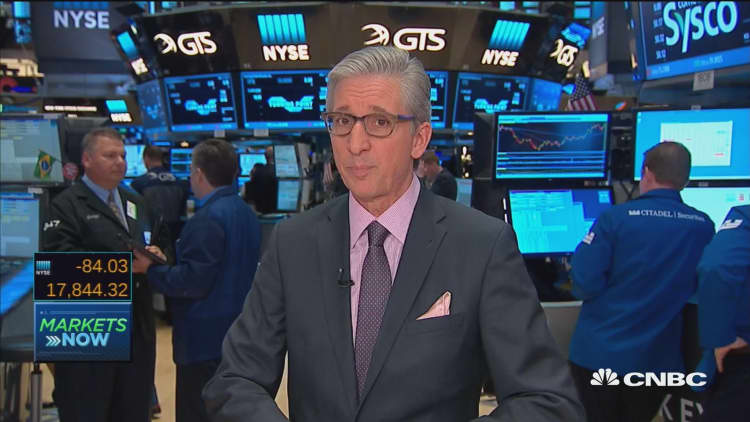
Macy's dismal first-quarter results are bringing back unwelcome memories of the financial crisis, as the retailer on Wednesday reported two metrics that harken back to that period of economic malaise.
During the first quarter, the department store chain said its comparable sales fell 5.6 percent. That marks a deceleration from its fourth-quarter same-store sales decline of 4.3 percent, and represents its most severe decrease in this metric since the second quarter of 2009. During that quarter, Macy's comparable sales slid 9.5 percent.
Meanwhile, the retailer reported a 36 percent year-over-year drop in operating income. That not only marks its seventh straight quarter of year-over-year declines for this measure, but it is far steeper than any quarter during the Great Recession, said Ken Perkins, president of Retail Metrics. In second quarter of 2009, by comparison, the retailer's operating income fell closer to 10 percent.
"Even more disconcerting is the sequential drop-off in operating income starting with -0.7 percent in third quarter 2014," Perkins told investors.
To be sure, the state of the consumer is significantly more stable than it was some seven years ago, as far more Americans are back at work. Yet even as jobs, wages, the housing market and savings rates have recovered, consumers have been reluctant to spend their money on traditional merchandise — particularly at department stores.
Macy's CFO Karen Hoguet addressed these challenges on a call with analysts, saying, "Clearly our industry is in something of a rough patch ... but the consumer seems to be doing OK."
"It's reasonable to conclude that the consumer will return to more aggressive discretionary spending at some point, hopefully sooner than later," she added.
Nonetheless, Macy's cut its full-year comparable-sales forecast. The company expects it to decline between 3 and 4 percent, compared with previous guidance for a drop of roughly 1 percent. The retailer also reduced its earnings guidance, saying it now expects earnings per diluted share (excluding settlement charges) to fall in a range of $3.15 to $3.40. Its previous guidance was $3.80 to $3.90 per diluted share.
In addition to the major consumer shift, Macy's, which traditionally generates roughly 5 percent of its annual sales from international tourism, was hit hard by a continued slowdown of U.S.-bound shoppers. Hoguet told analysts that sales on international tourists' credit cards fell 20 percent during the quarter, on top of a 21 percent decline in the year-ago period.
Sluggish sales of warm-weather merchandise, which were dented by a chilly spring, also weighed on the retailer's results — though Hoguet said these headwinds were less significant than those from the tourism slowdown. However, she expects the company's gross margin to be pressured in the second quarter, due to additional markdowns on that merchandise.
Macy's is not sitting by idly as it continues to lose sales to off-price competitors, and to experience-based spending categories such as travel and exercise. The retailer is increasing its footprint in both its low-price Backstage and Bluemercury beauty shops, and plans to increase its share of exclusive and private-label merchandise. The company also said it plans to cut expenses.
Hoguet said Macy's continues to assess its store fleet, including finding ways to monetize its real estate. That could mean potentially selling some of its stores and leasing back the property.
"Fortunately for Macy's, while net income has declined the group remains in the black. This gives it some room to maneuver — a luxury that other players, like Sears, don't have," said Neil Saunders, CEO of Conlumino retail research. "However, this does not mean that Macy's has time on its side."





